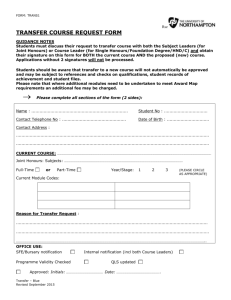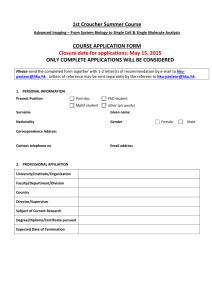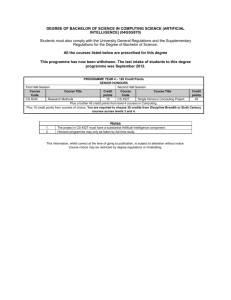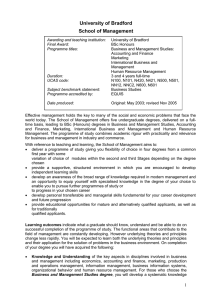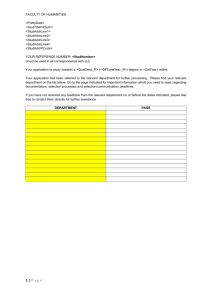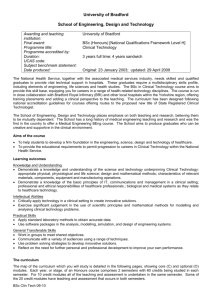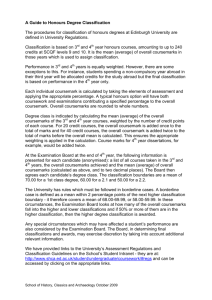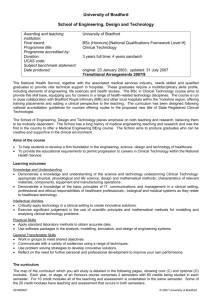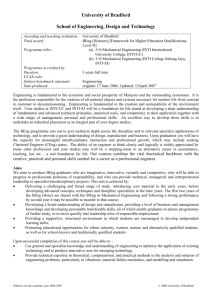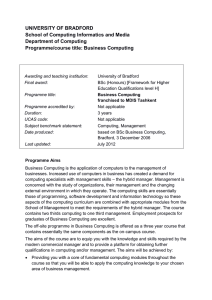Page 1 of 4 - University of Bradford
advertisement
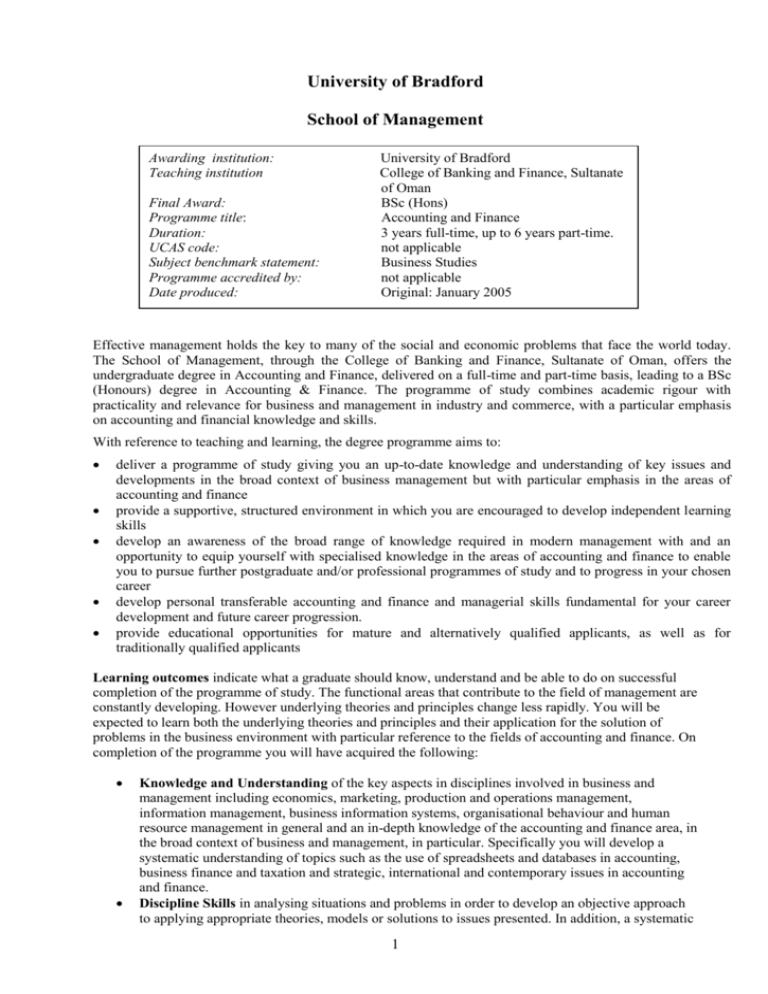
University of Bradford School of Management Awarding institution: Teaching institution Final Award: Programme title: Duration: UCAS code: Subject benchmark statement: Programme accredited by: Date produced: University of Bradford College of Banking and Finance, Sultanate of Oman BSc (Hons) Accounting and Finance 3 years full-time, up to 6 years part-time. not applicable Business Studies not applicable Original: January 2005 Effective management holds the key to many of the social and economic problems that face the world today. The School of Management, through the College of Banking and Finance, Sultanate of Oman, offers the undergraduate degree in Accounting and Finance, delivered on a full-time and part-time basis, leading to a BSc (Honours) degree in Accounting & Finance. The programme of study combines academic rigour with practicality and relevance for business and management in industry and commerce, with a particular emphasis on accounting and financial knowledge and skills. With reference to teaching and learning, the degree programme aims to: deliver a programme of study giving you an up-to-date knowledge and understanding of key issues and developments in the broad context of business management but with particular emphasis in the areas of accounting and finance provide a supportive, structured environment in which you are encouraged to develop independent learning skills develop an awareness of the broad range of knowledge required in modern management with and an opportunity to equip yourself with specialised knowledge in the areas of accounting and finance to enable you to pursue further postgraduate and/or professional programmes of study and to progress in your chosen career develop personal transferable accounting and finance and managerial skills fundamental for your career development and future career progression. provide educational opportunities for mature and alternatively qualified applicants, as well as for traditionally qualified applicants Learning outcomes indicate what a graduate should know, understand and be able to do on successful completion of the programme of study. The functional areas that contribute to the field of management are constantly developing. However underlying theories and principles change less rapidly. You will be expected to learn both the underlying theories and principles and their application for the solution of problems in the business environment with particular reference to the fields of accounting and finance. On completion of the programme you will have acquired the following: Knowledge and Understanding of the key aspects in disciplines involved in business and management including economics, marketing, production and operations management, information management, business information systems, organisational behaviour and human resource management in general and an in-depth knowledge of the accounting and finance area, in the broad context of business and management, in particular. Specifically you will develop a systematic understanding of topics such as the use of spreadsheets and databases in accounting, business finance and taxation and strategic, international and contemporary issues in accounting and finance. Discipline Skills in analysing situations and problems in order to develop an objective approach to applying appropriate theories, models or solutions to issues presented. In addition, a systematic 1 understanding of key aspects and a range of business skills and skills of relevance to professional practitioners in the field will be developed of relevance to the area of accounting and finance. An appreciation of the uncertainty, ambiguity and limits of knowledge will be learned. Personal Transferable Skills in information management, independent learning, project skills, written and oral skills, creative and systematic problem solving, report writing and presentation skills, and the learning ability needed to undertake appropriate further training of a professional or equivalent nature. The Curriculum The map of your studies is detailed below. Each ‘year’, or Stage, for both the full-time and part-time Honours course requires 120 credits per Stage. However, for the full-time course, each Stage will consist of two semesters with 60 credits being studied in each semester. For part-time study, the number of modules you study in the sessional period equivalent to a normal semester will be negotiable, depending on your circumstances relating to work and family commitments, but a minimum of 3 modules will be required. Although the University does not recruit directly to an Ordinary Degree, this route is available to students for whom a less intensive or extensive course of study is appropriate. An Ordinary Degree requires 100 credits in Stage 1 and 80 credits in Stages 2 and 3. The curriculum may change, subject to the University’ course approval, monitoring and review procedures, to ensure it is relevant and up-to-date in content. unit code Occ credits stage MAN0101M MAN0120D MAN0103M MAN0104M MAN0105M MAN0107M MAN0110M MAN0111M MAN0112M MAN0118M MAN1117M MAN0119M MAN0116M MAN0115M MAN0201M MAN0401M MAN0403M MAN0405M MAN0213M MAN0212M MAN0707M MAN0708M MAN0713M MAN0803M MAN0601M MAN0901M MAN0902M level unit title E E E E E E E E 10 10 10 10 10 10 10 10 1 1 1 1 1 1 1 1 1 1 1 1 1 1 1 1 E E E E E E E E E E E E E E E E E E E 10 10 10 10 10 10 10 10 10 10 10 10 20 10 10 10 10 10 10 1 1 1 1 1 2 2 2 2 2 2 2 2 2 2 2 2 2 2 1 1 1 1 1 2 2 2 2 2 2 2 2 2 2 2 2 2 2 Business Economics Business Law Foundations of Accounting 1 Foundations of Accounting 2 Foundations of Marketing Organisational Psychology Foundations of Production/Operations Mgt Quantitative Methods in Information Management Organisational Behaviour Organisational Information Systems The Macroeconomic Environment of Business Practice of Management Student Self Development Company Law and Administration Economics of Industry Accounting and Corporate Governance Accounting for Management Decisions Financial Management Computers in Accounting Taxation and Personal Finance Marketing Communications Marketing Research Marketing Management and Strategy Work Behaviour and Performance Information and Management Systems Resource Planning Management of Service Operations 2 C or O C C C C C C C C C C C O O C C C C C C C O O O O O O O MAN0402M MAN0404M MAN0407M MAN0408M MAN0308M MAN0607M MAN0208M MAN0209M MAN0808M C O E E E E E E E E E 10 10 10 10 10 10 10 10 10 3 3 3 3 3 3 3 3 3 3 3 3 3 3 3 3 3 3 MAN0809M E 10 3 3 MAN0703M MAN0617M MAN0311M MAN0205M MAN0204M 10 10 10 10 10 3 3 3 3 3 3 3 3 3 3 E E E E E Corporate Reporting and Global Accounting Strategic Accounting and Management Control Capital Markets, Investment and Finance International Finance and Treasury Management Contemporary Issues in Accounting Electronic Commerce Understanding Strategic Management Applied Strategic Management Human Resource Management: Resourcing and Development Human Resource Management: Relations and Reward Direct Marketing Corporate Identity and Brand Management Service Quality Global Business Environment International Business Strategy C C C C C C O O O O O O O O O Compulsory/Core module Optional module Assessment Regulations. The full progression regulations for both the Honours and Ordinary Degrees are maintained on the University Website at http://www.brad.ac.uk/admin/acsec/QA_Hbk/Undergrad_Regs_.html The class and division of the Honours degree that you are awarded is based on the overall weighted mark that you receive for Stage 2 (30% weighting) and Stage 3 (70% weighting). The degree is awarded on the basis of the following minimum final overall weighted average marks (the Board of Examiners has discretion of +/- 2%): 70% or above: 60% or above: 50% or above: otherwise: First Class Honours Second Class Honours – First Division Second Class Honours – Second Division Third Class Honours. If you complete Stage 1 successfully, you are eligible for a Certificate of Higher Education and if you complete Stage 2 successfully, you are eligible for a Diploma of Higher Education. The learning outcomes for these awards are consistent with those of the English Framework for Higher Education Qualifications and its descriptors. Teaching, Learning and Assessment The approach to teaching and learning aims to integrate applied and theoretical knowledge, taking into consideration the learning outcomes, progression through the levels of study, the nature of the mode of study (part-time or full-time) and the need for you to take greater responsibility for your own learning as you progress through the course. Stage 1 provides a foundation for your subsequent studies by providing you with the opportunity to acquire knowledge of the functional areas of business and management and the theoretical underpinning of these. In Stages 2 and 3 you specialise in the particular areas of accounting and finance, but within the broad context relating to business and management. In Stage 3 your studies become more strategic in nature. Methods of assessment are varied and linked to learning requirements. They will include closed and open book examinations, essays, coursework assignments and case studies. Throughout the course, you will acquire personal transferable skills that will be valuable in whatever career you wish to follow. 3 Admission Requirements All candidates for admission to the School of Management’s taught programmes must satisfy the University’s General, Course and English Language Requirements. All candidates must demonstrate by means of breadth of academic background and/or relevant experience and their motivation, that they will derive benefit from their studies and that they have the potential to succeed on their chosen programme of study. Candidates whose native language is not English will normally be required to have passed a test in English acceptable to the University. However, if you have previously studied and achieved acceptable qualifications that have been taught and assessed in English, an English Language waiver can be given. An admissions team will assess the suitability of applicants prior to making a recommended decision whether to reject an application, to offer a place conditional on the attainment of an acceptable qualification at an appropriate level, or to offer a place unconditionally. This will be for normally accepted entrance qualifications. For applicants without these, the College will consult with the University of Bradford’s Director of Studies for the programme with whom all final decisions will rest. In order to promote ‘widening access’, particularly for mature applicants, the Director of Studies will use an entrance test involving tests of ability, such as a critical thinking test, for applicants without the normal formal qualifications. A recruitment target is set of 100 students. A student may be permitted by the School to import specific academic credit for prior certificated or experiential learning up to a maximum limit of 50% of the balance of the award for which the student wishes to be registered, consistent with the University’s Regulations which can be accessed on the Bradford website at http://www.brad.ac.uk/admin/acsec/QA_Hbk/Ord_3_Undergrad_Awards.html. Student Support and Guidance You will be supported in your studies by a full-time Course Coordinator who will be available on a day-to-day basis. In addition, a student handbook and study guides will be provided. The latter will be in the form of printed module study guides in some cases and also in the form of Blackboard, a virtual learning environment from which you can access electronic material relating to your modules. You will also be able to access CDROM and online databases, including business and management periodicals and company information. The College also provides library facilities that also include access to online e-journals through the University of Bradford, and video viewing facilities. Further Information If you would like more information about the University of Bradford programme, please check the undergraduate prospectus available from the College of Banking and Financial Studies. You can also access information on its website at www.cbfs.edu.om General information about the University can be accessed from its website at http://www.brad.ac.uk 4
